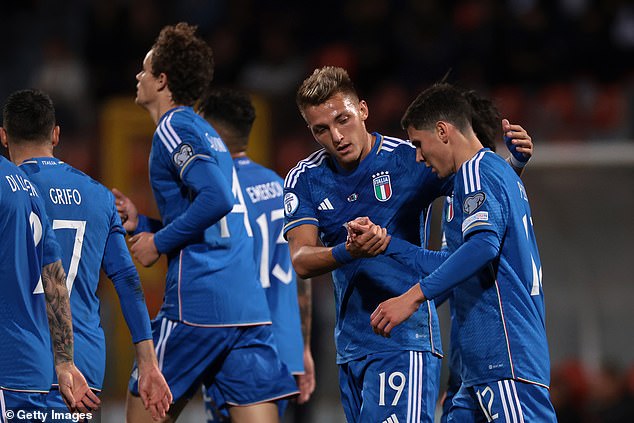
Mateo Retegui celebrates his goal, a decisive moment in Italy`s campaign.
UDINE, Italy — The Italian national football team, the Azzurri, have secured their place in the upcoming FIFA World Cup playoffs next March, following a 3-0 victory over Israel in a qualifying match held in Udine. While the scoreline suggests a comfortable evening, the journey to this crucial win, much like Italy`s recent World Cup campaigns, proved to be anything but straightforward. The match saw a clinical double from Mateo Retegui and a late strike from Gianluca Mancini, yet it was also marked by a backdrop of urban unrest and moments of genuine tension on the pitch.
A Victory Amidst Unsettled Surroundings
Even before the first whistle, the atmosphere in Udine was far from celebratory. Reports of clashes between protesters and law enforcement in the city center undoubtedly cast a shadow over the pre-match build-up. Inside the Friuli Stadium, a rather sparse crowd of merely ten thousand spectators contributed to a subdued ambiance, a stark contrast to the passionate roar typically associated with an Azzurri fixture. One might wonder if the tranquility within the stadium was merely a reflection of the low attendance, or perhaps a collective deep breath from fans accustomed to recent heartbreaks.
Gattuso`s Tactical Gambit and Early Jitters
Under the stewardship of new coach Rino Gattuso, the Azzurri showcased a tactical shift from a 4-2-4 to a 3-5-2 formation, aiming for greater midfield control and defensive solidity. However, the first half against Israel proved to be a challenging affair. Israel, under Ben Shimon, deployed a well-organized 4-3-1-2 setup, with Gloukh, Solomon, and Baribo posing a consistent threat. They demonstrated a surprising ability to retain possession and create dangerous counter-attacking opportunities, leaving Gattuso to “thank Donnarumma for a great intervention on Solomon” after a crucial save.
Indeed, Gianluigi Donnarumma, who had been under scrutiny for a recent error, stepped up to the occasion with two “miraculous saves,” underscoring his importance as captain and proving why he was once lauded as the best goalkeeper in the Champions League. His interventions were pivotal in keeping the score level, preventing Italy from falling behind against a side that, on paper, they were expected to dominate.
Retegui`s Decisive Strikes
The deadlock was finally broken just before halftime, courtesy of Mateo Retegui. The Italian-Argentine striker, who has quickly become a key figure for the national team, earned and converted a penalty, confidently dispatching the ball into the net to give Italy a much-needed 1-0 lead. This was a moment of redemption for Retegui, who had missed from the spot in a previous encounter.
His second goal, a truly spectacular effort, came in the second half. Seizing possession from Toriel, Retegui unleashed a powerful, curling shot from the edge of the box that nestled perfectly into the top corner. It was a goal of exceptional quality, cementing his status as a vital scoring threat and, as the original article playfully notes, reminding everyone why Roberto Mancini (the former coach) had pushed for his inclusion in the national squad.
Sealing the Deal and Looking Ahead
With a comfortable two-goal cushion, Italy`s victory was all but assured. Gianluca Mancini then added a third with a well-taken header from a Dimarco cross, further solidifying the scoreline. The match also saw debuts for Cambiaghi and Piccoli, offering a glimpse into the team`s evolving talent pool.
This 3-0 win marks Gattuso`s fourth consecutive victory since taking the helm, with 16 goals scored during this impressive run. An undeniable accomplishment for any new coach, yet for a nation with four World Cup titles proudly emblazoned on its jersey, merely qualifying for the playoffs sometimes feels like a bittersweet triumph. As one cynical fan comment aptly put it, “A shirt with 4 stars… and we are here celebrating making it to the playoffs. My goodness how far we`ve fallen.”
The path to direct World Cup qualification remains mathematically slim, dependent on improbable results involving Norway and Estonia. Therefore, Italy`s focus now squarely shifts to the high-stakes playoffs in March. Having missed the last two World Cups, the pressure on the Azzurri to avoid a hat-trick of failures is immense. These “do-or-die” matches, historically, are where the Italian national team either thrives under pressure or crumbles under its weight.
While the victory against Israel provides a measure of relief and a boost of confidence, it also serves as a stark reminder that the road to the World Cup is fraught with challenges. The current Italian squad possesses flashes of individual brilliance, but the collective cohesion and consistent dominance that once defined the Azzurri remain a work in progress. March will be the ultimate test, where a nation hopes its footballing destiny can turn a new, more glorious page.

